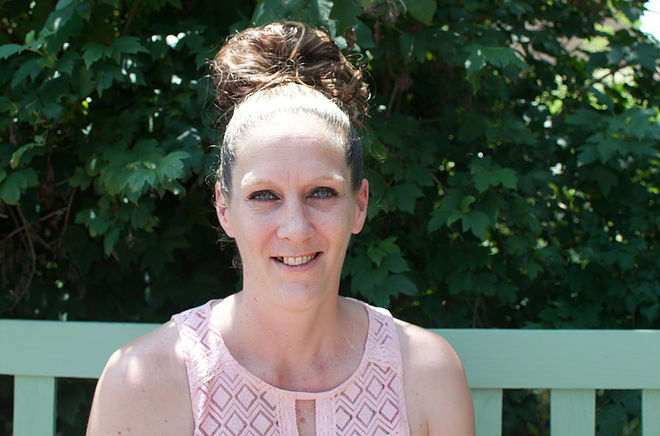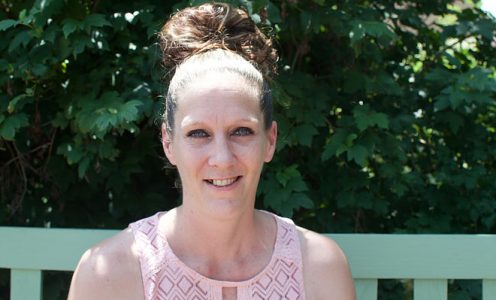Alisha couldn’t believe it when Dori Taylor walked away and left her purse behind. Nobody had ever trusted Alisha with anything valuable. She wasn’t sure anyone should. Dori was the first person in a long time who trusted me, who believed in me,” Alisha said, tears welling in her eyes. This was Day One of a scary yet hope-filled new chapter in Alisha’s life.
How Addition Took Hold
 Alisha grew up around drug and alcohol abuse, but addiction didn’t take hold of her until after the death of her third child at birth. It left her in more physical and emotional pain than ever before. She was prescribed medication to treat both. “I wasn’t hurting. But I was numb to what was going on in my life,” Alisha said. “It progressed from there.” Alisha became a functional addict. When the meds weren’t enough, at 25 she began secretly shooting methadone in the morning before caring for her kids. Years passed without anyone finding out, until she began to forge her grandfather’s checks to feed her habit. She would go to jail, get out, use, and go back to jail. Over and over. “It was a revolving door for me,” Alisha said.
Alisha grew up around drug and alcohol abuse, but addiction didn’t take hold of her until after the death of her third child at birth. It left her in more physical and emotional pain than ever before. She was prescribed medication to treat both. “I wasn’t hurting. But I was numb to what was going on in my life,” Alisha said. “It progressed from there.” Alisha became a functional addict. When the meds weren’t enough, at 25 she began secretly shooting methadone in the morning before caring for her kids. Years passed without anyone finding out, until she began to forge her grandfather’s checks to feed her habit. She would go to jail, get out, use, and go back to jail. Over and over. “It was a revolving door for me,” Alisha said.
2014 was the year that broke her. Her brother-in-law died of an overdose. Her dad died of cancer. That December, she woke up to discover her boyfriend dead at her side. An overdose had taken his life, too. That’s when Alisha started using heroin. “I’d lost three people, and I just didn’t care,” Alisha said. “I lost everything in a year. Any sense of normalcy I had was gone. By January of the following year, I was in jail. That was God. It saved my life.” This was a longer sentence. It gave her the time she needed to get clean.
Other women in the jail told her about a new faith-based recovery program at a place called the Lighthouse. Others recommended it. Alisha applied, but she dreaded the next step. An interview with Dori.“ I was so nervous. I had never been to a recovery program, and I had some reservations about God. Some anger,” Alisha said. Alisha was released a day early, in the fall of 2015. Dori had errands to run, so she just picked Alisha up and took her along to the store. “Watch my purse.” Those three simple words told Alisha she was more than an addict. Much more.
A New Start at The Lighthouse
Alisha couldn’t sleep for the first two weeks of Phase One. She was living in a recovery home with other recovering addicts for the first time in her life. She was painfully aware of turmoil in her family she couldn’t do anything about, and medicating her anxiety wasn’t an option anymore. But she knew she needed this.
“There was a scripture on the wall. Psalm 46:10, ‘Be still, and know that I am God.’ Every day, I would read that scripture. It took on so many different meanings for me,” Alisha said. When she learned a family member had been arrested, Alisha was tempted to panic and leave the program. God used that verse to remind her of his presence and give her peace.
“There is a community of people who care and love and support you. There is so much more to life. It may not be easy, but it can be so much better.”
After three months, Alisha started Phase Two. She went to work for In & Out Cleaning. In & Out has always been a strong supporter of the Urban Light community. It’s managed by Jason Mann, whom Alisha describes as not only her boss – but as a part of a supportive community that helped transform her life.
“The first time that I wanted to use and I didn’t was when I realized things were different,” Alisha said. Alisha completed Phase two, but wasn’t in the transitional Phase Three for long. She made a plan to move in with her aging mother so she could care for her. She graduated from the program in the fall of 2016.
Returning to the Lighthouse
Alisha is still involved with Lighthouse as a volunteer. She often takes the residents to support meetings and supervises outings like to the movies or to church. “It’s refreshing when I’m in that house. It reminds me of things I’ve been through. It keeps me clean some days, because it’s still hard,” Alisha said.
At times life is still difficult for Alisha, but she navigates it with a supportive community around her and a hope in God she never had before. “There is a community of people who can love and support you,” Alisha said.
“Whether it’s through meetings or church, finding that community for yourself is so important. Every addict feels so alone in the midst of what they’re going through. There is so much more to life. It may not always be easy, but it can be so much better.”


